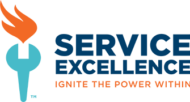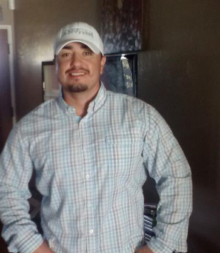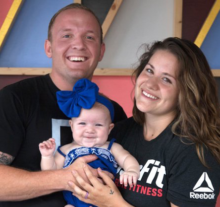Blog
What I Learned from Getting Back in the Truck
By James Walker • What I Learned from Getting Back in the Truck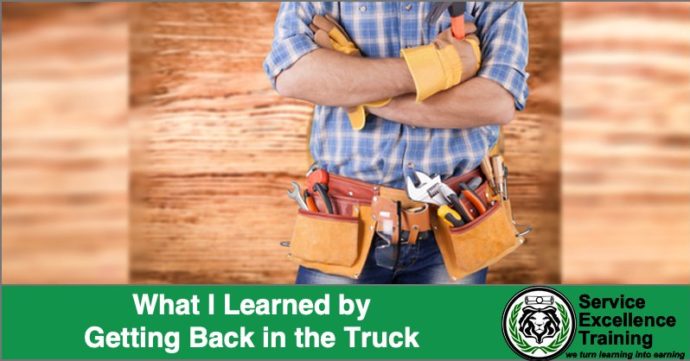
Twenty-three years ago, I strapped on a tool belt for the first time. After graduating high school, I left Houston for Puerto Rico. New construction was booming in the late ’90s, and I had an opportunity to learn a trade.
I was young, and I knew nothing. But a booming economy will create rose-colored glasses. Cody Electric hired me as an apprentice. Cody’s was heavily focused on new construction. Which meant Cody didn’t need me to be able to communicate or sell. I just had to make sure not to burn the place down.
Puerto Rico is where I first developed a love for solving problems. It’s where I learned to turn wrenches and run wire.
After Puerto Rico….
The trades have been a big part of my career since Puerto Rico. Here’s a little of my resume for my last twelve years:
- project director for a remodeling company
- a salesman for an HVAC franchise
- a consultant for an HVAC franchise
- a Vice President for an HVAC franchise and finally a
- COO for national plumbing franchise.
Over time, I transitioned from being in the field a lot to not much at all.
Back in the Truck
When I joined SET, Todd told me to knock off the rust and get back in a truck for a few weeks. Last week my only focus was to ride along with the technicians at Air Now in Alabama to see the world through their eyes again.
I knew I was more likely to get in the way than be of any benefit to them. But it was invaluable for me to gain a fresh perspective on what they faced every day.
Three Insights from my Ride Alongs
#1: Service Calls are Not for Robots!
The more removed you are from the customer, the more easily you can forget how the real world slaps the “To Do” checklist out of your hand. I have always taught a 10-step process for this, and a 7-step process for that. This can make the tech seem very robotic.
For example, always:
- Park in the street
- Always give a credibility statement
- Make sure that you ask five leading questions before diagnosis, etc.
Those rules make sure we cover the bases on every call, but they don’t always hold up in real life.
When not to use a credibility statement
Most of our calls were for maintenance, meaning the client had seen us multiple times over the past few years. Part of our process is to share a credibility statement with the customer that puts their fears to rest. Given the fact that customers often knew the technicians by name, forcing in a credibility statement would have been almost comical.
When to keep the questions brief
The same went for other parts of the process. Some customers were so to-the-point that a long series of questions would have made them upset with us.
Use the Principle of Situational Awareness
We do need to drill our team on every step of our principles and make sure they understand the value of each part. But we also must allow them to exercise situational awareness.
Just like in football, a true professional understands the exact route they need to run on any given play. They understand what the rest of the offense is doing. They understand what the defense will try to do. But they also understand that once the ball is snapped, everything becomes a variable.
#2 We Are in a People Business First
You need technical knowledge to be a service professional. Your success will be directly limited by your team’s ability to connect and communicate with people.
Trust Builds Profits
Profitable, highly-rated service experiences won’t be determined by your certifications, but by your ability to make quick, authentic, and trustworthy connections with the customers. Unfortunately, this doesn’t come naturally to everyone.
Technicians who are skilled at working with “things” can have a difficult time learning how to communicate and connect with people effectively.
We often define our team’s talent by their skill set, not their mindset. Doing so will hinder us from creating loyal, profitable customers.
The Industry Doesn’t Discriminate
Of the 11 service professionals at Air Now, only two of them came from the HVAC industry. In fact, the most complete service professional I met had come from the insurance industry. He had applied at Air Now on his lunch break wearing a three-piece- suit.
If you can’t find those service professionals that are naturally talented in the skills of communication, you must grow them yourself.
#3: Self Discipline is Key
If something is clearly defined, it is much easier to accomplish. It doesn’t necessarily take much discipline, because the “To Do” list is telling you what to do next.
Much like an assembly line process of putting a computer together. It doesn’t take much discipline to make sure you follow “A” before “B” and then “C”.
As we referenced before, people are complex. Homes are unique. Even two calls to the same home and the same customer will have different dynamics from one to the other.
A top-notch professional team is using their instinct and training for every customer, not just a checklist. That means the service professional must rely heavily on self-discipline instead of external pressure.
Why does this matter?
While riding along, I began to notice a pattern. Each service professional knew there was some flexibility with how they could engage any customer. Over time they allowed themselves not to use certain principles with every customer.
Like in the football analogy, a great receiver understands the play. When he makes an adjustment to run a different route because of the defense, it was probably the right move on that play. BUT every time he lines up again, he must return to the original design of the play. It cannot simply be a suggested “good idea”.
Just don’t let this flexibility create poor habits. Service professionals can get comfortable with picking and choosing what “works”. They can assume that because it was right for one call, it can be right for every call. Pretty soon “good enough” replaces “best possible” as your most common outcome.
That’s why it is so important that your team knows and understands your “Key Results Areas” (KRAs) and “Key Performance Indicators” (KPIs). It is vital to track and share your activity and productivity metrics and use them for incentive and accountability.
No matter how good the service professional and how extensive the training, the customer experience will erode over time if not tracked effectively.
Excellence isn’t a Final Destination, but Ongoing
Air Now is over a $6 Million-dollar residential service and replacement company. Their service professionals train daily and are some of the most capable of any I have come across.
What I re-learned from just a few days back in the truck is that the moment we think we’ve arrived, it is time to dive back into the basics all over again. There is always something to re-learn. There is always a fresh perspective to gain.
If you would like to dive back into the basics, check out these upcoming classroom series.
What SETs Us Apart?
Proactive Business Plans
A proactive business is a successful business. That's why our team takes the time to make sure every client has a proactive, not reactive, business plan. Our strategies make your business run more smoothly and profitable.
Proven Results
Our training services help businesses identify and achieve their key performance indicators (KPIs). Whether it's increased revenue or higher satisfaction rates, our methods allow you to see immediate and continued results.
Personalized Training
Our team of experts works hard to make sure your business gets personalized training. We'll work with your team one-on-one or in group settings to set and achieve your business goals. We develop training based on your goals!
Prioritizing People
We believe that people are the most valuable asset. We strive to provide outstanding benefits, life balance, leadership, and support to our team. We believe in helping people reach their greatest level of growth, contribution and satisfaction.

Trusted By
Business Ignition
SPARK
Classroom Training
Resources
Company
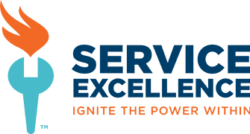
Join our newsletter
